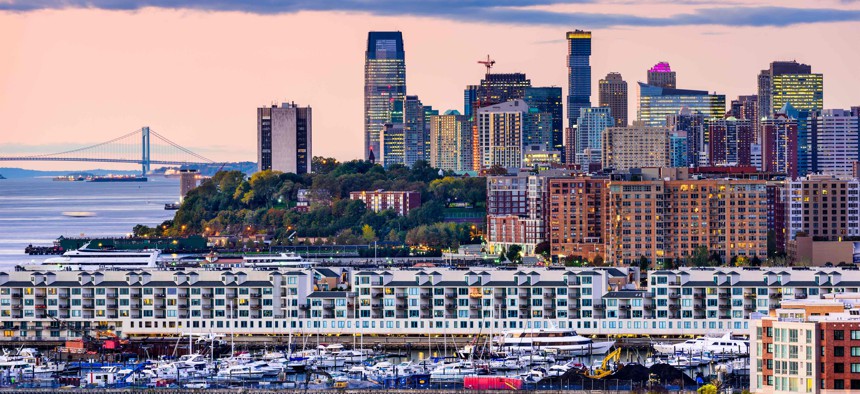New Jersey Leaders Agree On Deal to Hike Taxes on Millionaires

The skyline in Jersey City, New Jersey. Shutterstock
Governor Phil Murphy and top Democratic lawmakers announced plans on Thursday for a higher tax rate on incomes between $1 million and $5 million. The bulk of the revenue from the tax increase would cover the cost of a new middle class tax break.
New Jersey Gov. Phil Murphy and state legislative leaders said Thursday that they’d reached an agreement to raise the state’s income tax rate on people earning upwards of $1 million.
Most of the revenue from the tax hike would effectively go to pay for another policy the state leaders proposed: A tax rebate worth up to $500 for lower-income and middle-income families. The tax increase would apply to income between $1 million and $5 million a year, raising the rate to 10.75% from 8.97% for earnings in that range.
The rebate would be available to couples earning less than $150,000 a year and single people with incomes under $75,000, who have at least one dependent child. The governor’s office estimated about 800,000 households would qualify for the rebate.
Both of the tax measures are part of a revised budget plan for the 2021 fiscal year that the governor and state lawmakers are now working on. Like many states, New Jersey is bracing for lost revenues and unexpected costs brought on by the coronavirus pandemic.
"We do not hold any grudge, at all, against those who have been successful in life, but in this unprecedented time, when so many middle class families and others have sacrificed so much, now is the time to ensure that the wealthiest among us are also called to sacrifice,” Murphy, a Democrat, said during a press conference.
He described the tax hike as a “modest ask” for the state’s higher earners.
Murphy called for the “millionaire’s tax” in a budget proposal last month. And he has pushed previously, but unsuccessfully, to raise income taxes on millionaires since taking office in 2018.
A spokesperson for New Jersey’s Department of the Treasury said the tax increase is expected to bring in $390 million in revenue for the state in fiscal 2021, while the rebate program is expected to cost about $335 million, leaving an estimated difference of about $55 million.
Murphy said leftover revenue from the tax increase, after the cost of the tax rebate, would go to areas like schools, health care and housing.
The budget plan the governor put forward last month called for $4 billion in emergency borrowing to help the state deal with the economic and fiscal blow from the pandemic. It also included measures that aim to curb state spending by about $1.25 billion.
New Jersey’s general fund spending has been in the $33 billion to $37 billion range in recent years.
Republicans, minorities in both chambers of the state legislature, bashed the tax proposals, raising concerns that higher earners would flee to lower tax states and pointing out the tax rebates would be paid out next year when Murphy would be campaigning for reelection.
“Year after year, IRS data shows that New Jersey continues to lose significantly more taxable income from high wage earners leaving the state than it gains from those who are moving in from elsewhere,” Senate Republican Budget Officer Steven Oroho said in a statement.
“The Democrats’ tax deal will accelerate that trend, make our state’s finances more unstable, and ultimately drive taxes higher for everyone,” he added.
Assembly Republican Leader Jon Bramnick quipped that the tax measures would be “a gift for the Florida economy.”
And state Sen. Sam Thompson, another Republican, called the proposals, “nothing more than a redistributionist scheme that provides no net benefit for the state’s finances.”
In addition to the millionaire’s tax, Murphy’s budget proposal called for other tax policies geared towards raising revenue from wealthier residents, such as restoring a tax on limousine sales, removing a tax cap on boats, and applying a surcharge on individual “qualified business income” eligible for a certain federal tax break.
Murphy and the Democratic leaders said on Thursday that they were on track to finalize a budget deal ahead of a Sept. 30 deadline. Once approved, the plan would take effect on Oct. 1 and would cover a nine-month period ending June 30 of next year. The governor declined during the press conference to get into many specifics about what the final budget will include, beyond outlining the two tax proposals.
Bill Lucia is a senior reporter for Route Fifty and is based in Olympia, Washington.
NEXT STORY: Momentum for Basic Income Builds as Pandemic Drags On






